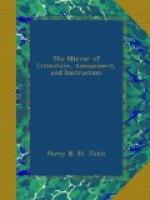“Master Mason, of Trinity College, sent his pupil to another of the fellows to borrow a book of him, who told him, ’I am loth to lend books out of my chamber, but if it please thy tutor to come and read upon it in my chamber, he shall as long as he will.’ It was winter, and some days after the same fellow sent to Mr. Mason to borrow his bellows, but Mr. Mason said to his pupil, ’I am loth to lend my bellows out of my chamber, but if thy tutor would come and blow the fire in my chamber, he shall as long as he will.’
In the next page is a note on the Nature of Property, in the perspicuous style of a master-mind:
“There is nothing which so generally strikes the imagination, and engages the affections of mankind, as the right of property; or that sole and despotic dominion which one man claims and exercises over the external things of the world, in total exclusion of the right of any other individual in the universe. And yet there are very few that will give themselves the trouble to consider the original and foundation of this right. Pleased as we are with the possession, we seem afraid to look back to the means by which it was acquired, as if fearful of some defect in our title; or at best we rest satisfied with the decision of the laws in our favour, without examining the reason and authority upon which those laws have been built. We think it enough that our title is derived by the grant of the former proprietor, by descent from our ancestors, or by the last will and testament of the dying owner; not caring to reflect that (accurately and strictly speaking) there is no foundation in nature, or in natural law, why a set of words upon parchment should convey the dominion of land; why the son should have a right to exclude his fellow creature from a determinate spot of ground, because his father had so done before him; or why the occupier of a particular field, or of a jewel, when lying on his death bed, and no longer able to maintain possession, should be entitled to tell the rest of the world which of them should enjoy it after him.—(2 Blac. Comm. 2)
“The two sheriff’s of London are the one sheriff of Middlesex; thus constituting in the latter case, what may be denominated, in the words of George Colman the Younger, (see his address to the Reviewers, in his vagaries,) ‘a plural unit.’ Henry the First, in the same charter by which he declared and confirmed the privileges of the City of London, (and among others, that of choosing their own sheriffs,) conferred on them, in consideration of an annual rent of 300_l._, to be paid to his majesty and his successors for ever, the perpetual sheriffalty of Middlesex. This was an enormous price; 300_l._. in those days were equal to more than three times as many thousands at the present time.
Here is a lively commentary upon the Inclosure Acts:




